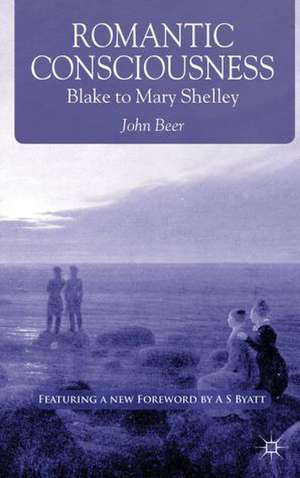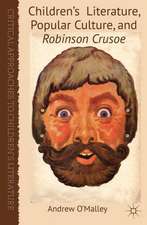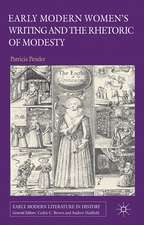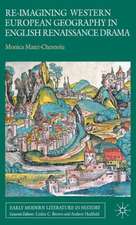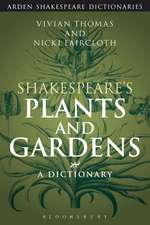Romantic Consciousness: Blake to Mary Shelley
Autor J. Beeren Limba Engleză Paperback – 22 iun 2004
| Toate formatele și edițiile | Preț | Express |
|---|---|---|
| Paperback (2) | 382.75 lei 43-57 zile | |
| Palgrave Macmillan UK – 2003 | 382.75 lei 43-57 zile | |
| Palgrave Macmillan UK – 22 iun 2004 | 382.95 lei 43-57 zile | |
| Hardback (1) | 387.75 lei 43-57 zile | |
| Palgrave Macmillan UK – 22 iun 2004 | 387.75 lei 43-57 zile |
Preț: 382.95 lei
Nou
Puncte Express: 574
Preț estimativ în valută:
73.28€ • 76.71$ • 60.63£
73.28€ • 76.71$ • 60.63£
Carte tipărită la comandă
Livrare economică 07-21 aprilie
Preluare comenzi: 021 569.72.76
Specificații
ISBN-13: 9781137018113
ISBN-10: 1137018119
Pagini: 209
Ilustrații: XVII, 209 p. 3 illus.
Dimensiuni: 140 x 216 x 15 mm
Greutate: 0.3 kg
Ediția:2003
Editura: Palgrave Macmillan UK
Colecția Palgrave Macmillan
Locul publicării:London, United Kingdom
ISBN-10: 1137018119
Pagini: 209
Ilustrații: XVII, 209 p. 3 illus.
Dimensiuni: 140 x 216 x 15 mm
Greutate: 0.3 kg
Ediția:2003
Editura: Palgrave Macmillan UK
Colecția Palgrave Macmillan
Locul publicării:London, United Kingdom
Cuprins
Foreword Consciousness and the Mystery of Being Blakes Fear of Non-Entity Coleridge, Wordsworth and 'Unknown Modes of Being' Keats and the Highgate Nightingales De Quincey and the Dark Sublime Tennyson, the Cambridge Apostles and the Nature of 'Reality' Shelley and Byron: Polarities of Being Mary Shelley's Mediation Appendix: Wordsworth's Later Sense of Being Abbreviations Index
Recenzii
'John Beer draws on half a century of reading and thinking in this remarkable commentary on the fortunes of 'Being' in the works of the great Romantics. John Beer has always been distinguished as a scholar by his ability both to value the historical idiosyncrasy of his subjects while relating their writings to the perennial human preoccupations, and his book is full of sympathetic illumination and intellectual delight.' - Seamus Perry, Fellow of Balliol College and Tutor in English, University of Oxford, UK
'This beautifully written book shows how close readings of the works of the canonical Romantics Blake, Coleridge, Wordsworth, Keats, De Quincey, Mary Shelley, P.B. Shelley and Byron can still enlighten readers interested in topical conceptions of consciousness. Framing his study in a critical discussion of the theories of Antonio Damasio, John Beer probes the distinction between Being and consciousness, an elusive yet vital theme explicated here with an admirable lightness of touch. Beer brings the Romantics into conversation, comparing generously-quoted passages of poetry and prose, and the result is an enhanced understanding not only of prototype notions regarding the darker regions of the subconscious mind, but also of the patterns of influence, allusion and dialogue between these writers. An excursion into the introspective concerns of Tennyson and the circle of Cambridge Apostles deftly demonstrates the continuity of the Being-consciousness duality at theoutset of the Victorian period. Romantic Consciousness is to my mind as essential as it is pleasurable reading for scholars and advanced students of Romanticism and nineteenth-century literature.' - James Vigus, Visiting Research Fellow, Queen Mary, University of London, UK
'This beautifully written book shows how close readings of the works of the canonical Romantics Blake, Coleridge, Wordsworth, Keats, De Quincey, Mary Shelley, P.B. Shelley and Byron can still enlighten readers interested in topical conceptions of consciousness. Framing his study in a critical discussion of the theories of Antonio Damasio, John Beer probes the distinction between Being and consciousness, an elusive yet vital theme explicated here with an admirable lightness of touch. Beer brings the Romantics into conversation, comparing generously-quoted passages of poetry and prose, and the result is an enhanced understanding not only of prototype notions regarding the darker regions of the subconscious mind, but also of the patterns of influence, allusion and dialogue between these writers. An excursion into the introspective concerns of Tennyson and the circle of Cambridge Apostles deftly demonstrates the continuity of the Being-consciousness duality at theoutset of the Victorian period. Romantic Consciousness is to my mind as essential as it is pleasurable reading for scholars and advanced students of Romanticism and nineteenth-century literature.' - James Vigus, Visiting Research Fellow, Queen Mary, University of London, UK
Notă biografică
John Beer is Emeritus Professor of English Literature, University of Cambridge and Fellow of Peterhouse. His work on Romanticism includes Coleridge the Visionary, Coleridge's Poetic Intelligence, Blake's Humanism, Blake's Visionary Universe, Wordsworth and the Human Heart, Wordsworth in Time, Questioning Romanticism (ed.), Romantic Influences and Providence and Love .He has edited Coleridge's Poems for Everyman's Library, his Aids to Reflection for the Collected Works and is General Editor of the series Coleridge's Writings .
